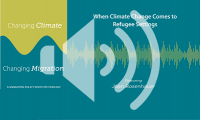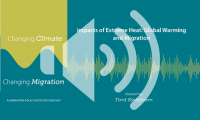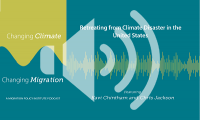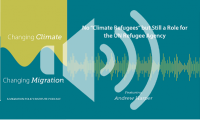
Julian Hattem
Editor, Migration Information Source
Julian Hattem is Editor of the Migration Information Source, the online journal of the Migration Policy Institute, and is responsible for its content and publication.
Before joining MPI, he spent a decade as a journalist focusing on international migration, politics, and conflict. He has been on staff with the Associated Press, The Hill, and the Yomiuri Shimbun, and has been awarded journalism fellowships from the Heinrich Boell Foundation North America and the International Reporting Project to report on migration in Southern Europe and Southeast Asia. As a freelance journalist he reported from four continents, and his articles have been published by outlets including the Guardian, the Washington Post, Public Radio International, World Politics Review, National Public Radio, and Quartz.
Mr. Hattem holds a bachelor’s degree in anthropology from the University of Chicago and a master’s degree in conflict studies from the London School of Economics.
Bio Page Tabs
For this episode of Changing Climate, Changing Migration, we speak with Joan Rosenhauer, the executive director of Jesuit Refugee Service/USA, about how natural disasters and other environmental harms affect her organization’s work and its faith-based mission.
The International Organization for Migration (IOM), in 2015 created a special division responsible for migration-related issues involving the environment and climate change. The division just got a new leader and is looking to embark on a new agenda.
Global warming and extreme heat are behind many of the phenomena linked to climate change. Hotter weather also has an impact on migration and on migrants, ranging from destinations such as the Middle East to parts of the United States. In recent years, there has been more attention paid to cases of migrant workers dying from the heat.
In Western countries, a common narrative has developed that only poor or developing nations will have to confront human displacement caused by climate change. But communities in the United States and elsewhere have repeatedly moved because of environmental disasters such as flooding. This episode of our Changing Climate, Changing Migration podcast features a discussion on the U.S.
Technically, people forced to move because of climate disasters are not considered “refugees.” But the UN High Commissioner for Refugees still takes climate issues into account, and since 2020 Andrew Harper has been its special advisor on climate action.
Pages
Recent Activity
Reliable access to food—or lack thereof—can affect an individual’s decision to migrate. Climate change has the ability to exacerbate food insecurity, especially for farmers and others who live off the land, which can have repercussions for human mobility. In this episode of our Changing Climate, Changing Migration podcast, we talk with Megan Carney, an anthropologist and director of the University of Arizona’s Center for Regional Food Studies, to examine the role of food security in the connection between climate change and migration.






